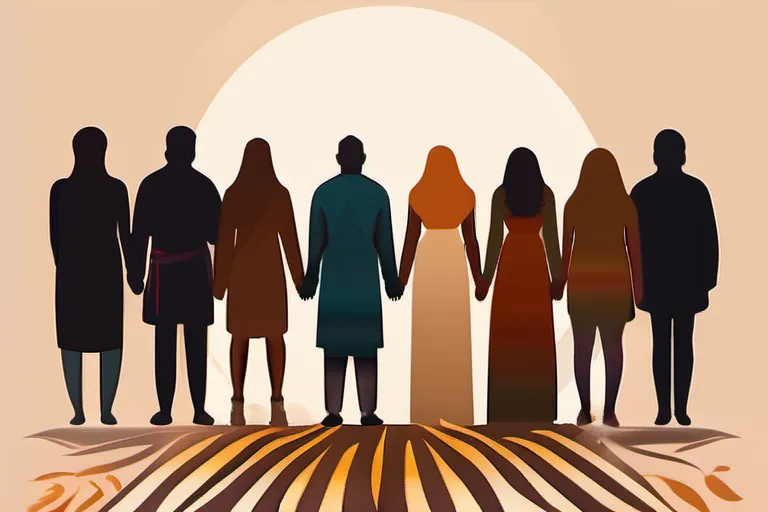Exploring the foundations of morality, ethics, and human behavior in a secular context.
In today’s diverse world, many people question whether morality can exist without religious beliefs. This article delves into this intriguing topic, examining various perspectives and providing insights into the nature of morality itself.
The Historical Role of Religion in Morality
Can we really be moral without religion? For centuries, religion has been seen as the cornerstone of morality, guiding individuals and societies through ethical dilemmas and shaping cultural norms. But what if we peel away the layers of religious doctrine and explore a secular framework for ethics?
Tracing the historical roots, one can see how religion deeply intertwined with morality from ancient times. In many cultures, moral codes were born out of religious teachings, making it almost impossible to separate the two. For instance, the Ten Commandments in Judaism and Christianity outline a set of ethical guidelines that have influenced legal systems around the world.
However, as societies evolved, so did our understanding of morality. Philosophers like Aristotle and later Kant began to develop theories on ethics without explicitly relying on religious doctrines. They focused on concepts like reason, justice, and human dignity, laying the groundwork for a more secular approach.
One might wonder, then, how do we navigate moral decisions in a world less anchored by religious instruction? Can we rely solely on our own reasoning and empathy to make ethical choices?
The journey from religion to morality is not just about removing faith; it’s about understanding the underlying principles that drive our actions. Whether through secular philosophies or personal introspection, many find they can still navigate a path of integrity and compassion.
So, can we be moral without religion? Perhaps the answer lies in recognizing that while religious teachings provide a framework, the essence of morality is rooted in human nature itself—our capacity for empathy, our understanding of right and wrong, and our desire to live harmoniously with others.
Defining Morality: Secular and Religious Perspectives
Can we truly be moral without religion? Let’s dive into the heart of this question by first defining morality and exploring how different perspectives shape our understanding of it.
In a religious context, morality is often viewed as a set of rules or commandments handed down by a divine being. These rules are seen as infallible, guiding individuals to lead righteous lives. Think of these guidelines like a map; while they might be detailed and comprehensive, following them can sometimes feel like walking in someone else’s footsteps.
On the other hand, secular definitions of morality often come from philosophical discussions about what is right and wrong based on human reason and experience. This perspective sees morality as more fluid, allowing for personal growth and adaptation to changing circumstances. It’s akin to navigating a vast landscape with no set path; you must use your own judgment and intuition to make the best decisions.
Interestingly, both secular and religious approaches share some common ground. They both aim to foster a sense of community and cooperation among individuals. However, their methods differ significantly. Religious morality often relies on fear of punishment or reward in an afterlife, whereas secular ethics might focus more on creating harmony and justice within society.
So, can we be moral without religion? The answer might lie in the blending of these two perspectives. By understanding both, we can create a framework that supports personal growth while fostering social cohesion. After all, isn’t morality ultimately about doing what is best for ourselves and those around us?
The Foundations of Secular Ethics
Can we build a sturdy ethical framework without relying on religious doctrines? This question has intrigued thinkers for centuries, and as we delve into the foundations of secular ethics, it becomes clear that morality can indeed thrive in a non-religious context. Let’s explore three key philosophical theories: utilitarianism, deontology, and virtue ethics.
Utilitarianism, championed by philosophers like Jeremy Bentham and John Stuart Mill, suggests that the best actions are those that maximize overall happiness or utility. Imagine society as a large garden; utilitarianism is like planting flowers where they will bloom most beautifully and evenly across the entire landscape. It focuses on outcomes: is an action beneficial for the majority? Yet, this approach can be criticized for potentially overlooking individual rights in favor of collective well-being.
Deontology, introduced by Immanuel Kant, posits that certain actions are morally right or wrong regardless of their consequences. Think of deontology as a strict set of rules like those in chess—each move must follow established principles, even if they seem to go against immediate utility. This theory emphasizes duty and respect for persons, ensuring that individuals’ rights and autonomy are protected. However, it can be seen as rigid and inflexible in dynamic situations where context is crucial.
Virtue ethics, rooted in the works of Aristotle, focuses on developing good character traits—virtues like courage, honesty, and compassion. This approach emphasizes moral education and personal development over strict rules or outcomes. Virtue ethics is like nurturing a seed to grow into a strong tree; it values the journey towards becoming a better person through continuous self-improvement. While this method encourages personal growth, it can sometimes be challenging to define universal virtues that apply across different cultural contexts.
Each of these theories offers unique perspectives on moral behavior, and understanding them can help us navigate complex ethical dilemmas in our secular world. By integrating insights from utilitarianism, deontology, and virtue ethics, we can create a comprehensive framework for morality that respects individual rights while considering the greater good.
Can these theories coexist in harmony, or do they clash? How can we apply them to real-world situations where ethical principles often intersect?
Moral Behavior in Non-Religious Societies
Can we truly practice moral behavior without religion? Throughout history, non-religious societies have shown that ethical principles are deeply ingrained in human nature, regardless of divine commandments or religious teachings. Let’s explore some fascinating examples to see if morality can flourish outside the bounds of traditional religion.
Imagine a society where laws and norms are based on reason rather than faith. The ancient Greeks, for instance, were pioneers in this regard. Their concept of démos, or the voice of the people, played a crucial role in shaping a democratic system grounded in rational discourse and ethical deliberation.
Another striking example comes from the 18th century Enlightenment in Europe. Philosophers like Immanuel Kant proposed that our moral duties could be derived through reason alone, emphasizing categorical imperatives that bound all individuals regardless of religious belief or social status. Could these secular principles have stood on their own without any theological underpinnings?
The story of the Indian independence movement also offers a compelling case study. Leaders like Mahatma Gandhi and Jawaharlal Nehru led non-violent resistance against British colonialism, advocating for justice and freedom through a blend of ethical principles rooted in reason and compassion rather than religious doctrine.
These examples suggest that moral behavior is not exclusively tied to religion. Ethical standards can arise from rational inquiry, social consensus, and the pursuit of human welfare. The question then becomes: Can we build societies based on these secular ethics without losing sight of what truly matters—human well-being and mutual respect?
Clearly, history provides ample evidence that moral behavior is not only possible but also highly effective in non-religious contexts. By focusing on reason and empathy, we can create a framework for ethical living that transcends traditional religious boundaries.
The Role of Empathy and Reason in Secular Morality
Can we be moral without religion? A compelling question indeed, especially when we consider the role of empathy and reason in shaping our moral behavior. In a world where secularism is increasingly prevalent, it’s essential to explore how these two powerful forces can guide us toward ethical living.
Empathy serves as a bridge that connects one person’s suffering with another’s. Imagine stepping into someone else’s shoes—how would you feel if they were in your situation? This simple act of imagining and feeling their pain is the essence of empathy. It’s what makes us human, allowing us to understand and share the feelings of others. Empathy is like a lighthouse, illuminating the moral landscape by guiding our actions toward kindness and consideration for all.
But why stop at just feeling? Reason plays an equally crucial role in transforming empathy into meaningful action. It helps us analyze situations, weigh different perspectives, and make informed decisions based on what’s right rather than just what feels good. Think of reason as the compass that ensures our path toward morality is clear and aligned with ethical principles.
In a secular context, these tools—empathy and reason—are indispensable. They help us navigate through complex moral dilemmas without relying solely on religious doctrines or traditions. Consider the story of Nelson Mandela; his journey from prison to presidency was driven by both empathy towards those who suffered under apartheid and reasoned arguments that advocated for equality and justice. Without these, his transformation into a global icon might not have been possible.
So, can we be moral without religion? Absolutely! With the power of empathy to feel others’ pain and reason to guide our actions, we can build a society based on mutual respect, compassion, and fairness. The challenge lies in fostering these qualities within ourselves and promoting them among others, ensuring that morality remains a cornerstone of human behavior even in secular times.
Fostering a Compassionate Society Without Religion
Fostering a compassionate society without religion requires us to dig deep into our human nature and understand that compassion, like a garden, needs nurturing in any context. How can we cultivate this garden of empathy when religious teachings are not guiding our path?
One practical suggestion is to emphasize the importance of education in cultivating moral values. By teaching children about the impact of their actions on others and fostering critical thinking, we empower them to make informed decisions based on compassion rather than just blind adherence to rules.
Another approach involves community service and volunteering. Engaging in acts of service can help us connect with our fellow humans on a deeper level, reminding us that we are all part of the same human tapestry. These experiences can be incredibly transformative, fostering a sense of shared responsibility and mutual respect.
We must also address systemic issues that perpetuate inequality. By promoting fair policies and advocating for marginalized communities, we create an environment where everyone has the opportunity to thrive. This is not just about compassion; it’s about ensuring justice and equality for all.
Lastly, let us embrace diversity and learn from different cultures and perspectives. Embracing various viewpoints can broaden our understanding of what true morality might look like in a pluralistic world. By doing so, we enrich our society and foster a more inclusive and compassionate community.
Conclusion
 Ultimately, we find that while religion may have historically played a significant role in shaping moral norms, it is not essential for individuals to be moral. By understanding the roots of our ethical behavior, we can foster a more compassionate and just society, regardless of religious affiliation.
Ultimately, we find that while religion may have historically played a significant role in shaping moral norms, it is not essential for individuals to be moral. By understanding the roots of our ethical behavior, we can foster a more compassionate and just society, regardless of religious affiliation.











